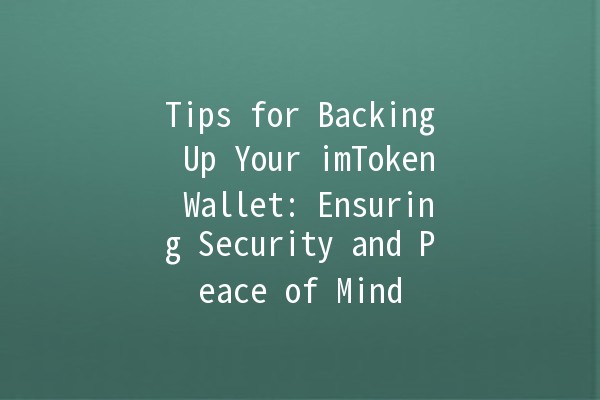Managing a digital wallet like imToken involves not only the convenience of accessing and using your cryptocurrency but also the responsibility of securing it. One critical aspect of wallet security is backing it up. In this article, we'll cover key strategies for effectively backing up your imToken wallet and safeguarding your assets.
Backups are essential because they allow you to recover your assets in case of device failure, loss, or theft. By failing to back up your wallet, you risk losing access to your cryptocurrencies forever. Understanding the potential risks involved and how a backup can mitigate these risks is crucial for any crypto user.
Your seed phrase, consisting of 12 to 24 randomly generated words, is the key to your wallet. Ensure you:
Write it Down Securely: Store it in a safe place, ideally not in digital form. A physical copy mitigates the risk of hacking.
Avoid Sharing: Never share your seed phrase with anyone, as this gives them complete access to your wallet.

Example of Application: When you first set up your wallet, you will be prompted to write down your seed phrase. Use a durable, waterproof material, and store it in a safety deposit box for extra security.
Keeping your imToken wallet app updated is not just about new features but also about security enhancements.
Check for Updates Frequently: Set aside time each month to check the app store for any updates.
Read Release Notes: Understand what security improvements or bug fixes were made in the update.
Example of Application: Allocate specific days in your calendar, such as the first Monday of each month, to update all financial apps, including imToken. This creates a security routine that you can rely on.
Multisignature wallets require multiple private keys to authorize a transaction, adding an extra layer of protection.
Consider Using One for Large Holdings: Only use a multisignature wallet for significant assets, as they can be more complex to manage.
Choose Trusted Cosigners: Ensure that any cosigners are trustworthy to prevent unauthorized access.
Example of Application: Create a multisignature wallet with a close friend or family member. This ensures that both parties must agree before any significant transaction can take place, reducing the risk of fraud.
Setting a schedule for backups can help ensure that you always have the latest information secured.
Backup Monthly or After Major Transactions: Depending on your activity level, factor this frequency into your financial routine.
Use Various Locations: Store backups in different secure locations (e.g., one in a bank, another at home).
Example of Application: After any significant changes, such as transferring large amounts of cryptocurrency, immediately create a backup of your wallet's data. This way, you know your most recent transactions are secured.
Knowing how to use your backup can save you a headache in stressful situations.
Familiarize Yourself with Recovery Methods: Take time to explore how to restore your wallet using your seed phrase or backup file.
Test the Recovery Process: Consider doing a practice run with a small amount of cryptocurrency to confirm you understand the process.
Example of Application: Spend an afternoon going through the recovery process of your imToken wallet. Use a test wallet or a small sum to ensure everything works smoothly before you face a real emergency.
Q1: What happens if I lose my seed phrase?
If you lose your seed phrase, you will likely lose access to your wallet and all the assets it contains. Unlike traditional banking, there are no recovery options available through customer support. Therefore, it is crucial to store it in a safe place.
Q2: Can I back up my imToken wallet to a cloud service?
While cloud services offer convenience, they also introduce security risks. Storing sensitive information online could make it vulnerable to hacking. It’s best to stick with physical backups or encrypted local storage.
Q3: How can I verify my backup is successful?
To verify your backup, attempt to restore your wallet on a different device using your seed phrase or backup file. If you can access your funds without issue, your backup is successful.
Q4: Is it necessary to back up every time I make a transaction?
It isn’t strictly necessary to back up after every transaction, but it’s advisable after significant transactions or whenever you update your wallet. This ensures your most recent information is saved.
Q5: What if I want to switch wallets?
If you decide to switch to another wallet, ensure you follow the backup steps for your imToken wallet first. Then, export your seed phrase and import it into your new wallet, erasing any data or backup files associated with the old wallet securely.
Q6: How should I manage my wallet after backing it up?
Regular maintenance is vital. Review your wallet settings, update security features, and remain aware of potential phishing attacks. Keeping security awareness high is essential in the everchanging crypto environment.
By implementing these essential backup strategies, securing your imToken wallet can be a seamless part of your cryptocurrency management routine. Making these practices a habit not only enhances your security but also brings peace of mind, allowing you to focus on your investments and transactions with confidence.